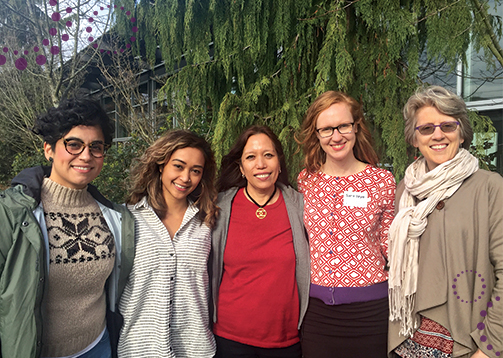February 23, 2018
My Year of Waking Up – Series: Part 3 of 5

My Year of Waking Up: “Do things that are uncomfortable”
I started this series by saying that 2017 was a big year of learning for me about individual and institutional racism, about the difference between equality and equity, and about myself as a white person of privilege. After hearing Bryan Stevenson, author of Just Mercy, I have been focused on the 4 things he encouraged us to do. The second of which was to “do things that make us uncomfortable”. Thanks to our staff Intercultural Competency Committee I had the opportunity to jump right in to my own discomfort, through a wonderful all-staff learning event.
The Committee hosted our annual learning retreat, which has been happening for more than 10 years. The retreat provides a chance for us to step away from our daily work and dive into shared learning about how we can realize our strategic priorities, improve our program and services, or enhance our individual growth. In preparation for this year’s retreat, we were encouraged to take one or more of the Implicit Bias tests, through Harvard’s Project Implicit. As I began answering the questions, I felt calm and confident that my non-biased view of the world would be obvious in my survey answers. It was not. As you might guess, the result showed that I have an ‘implicit preference for Northern Europeans’ – white people. Despite my initial disbelief and shame, I woke up a little more, as I realized that implicit bias is a part of my very being – it is in my cells, by genes, my history – it is inextricably tied to my lived experience. It creates the gap between what I believe and how I act – consciously or unconsciously. It informs my thoughts, words and actions whether I like it or not. This doesn’t mean that I just accept this fact, but instead use this awareness to listen more deeply to those who are affected by my bias and the bias of others.
Though our retreat focused on the results of our first organization-wide Cultural Responsiveness Assessment (as part of Portland State University’s Protocol for Culturally Responsive Organizations), this exercise provided an opportunity for each of us to open the day’s learning a little more aware of how our implicit bias affects how we show up every day.
Bryan Stevenson encouraged us to do things that are uncomfortable – to have uncomfortable conversations. My implicit bias learning has made me more open to having different and perhaps uncomfortable conversations. I have begun to refer to myself as a “white leader” in conversations, to challenge myself and others to recognize the implicit bias I/we bring to our work. Our Board is having brave conversations about what it will take to add diversity to our Board, given that we are largely a white group, with mostly white networks. They are committed to prioritizing diversity and moving beyond our traditional circles to recruit a more diverse Board.
Most of all, we are all getting more comfortable being uncomfortable.
<<Back to Part 2 On to Part 4>>



